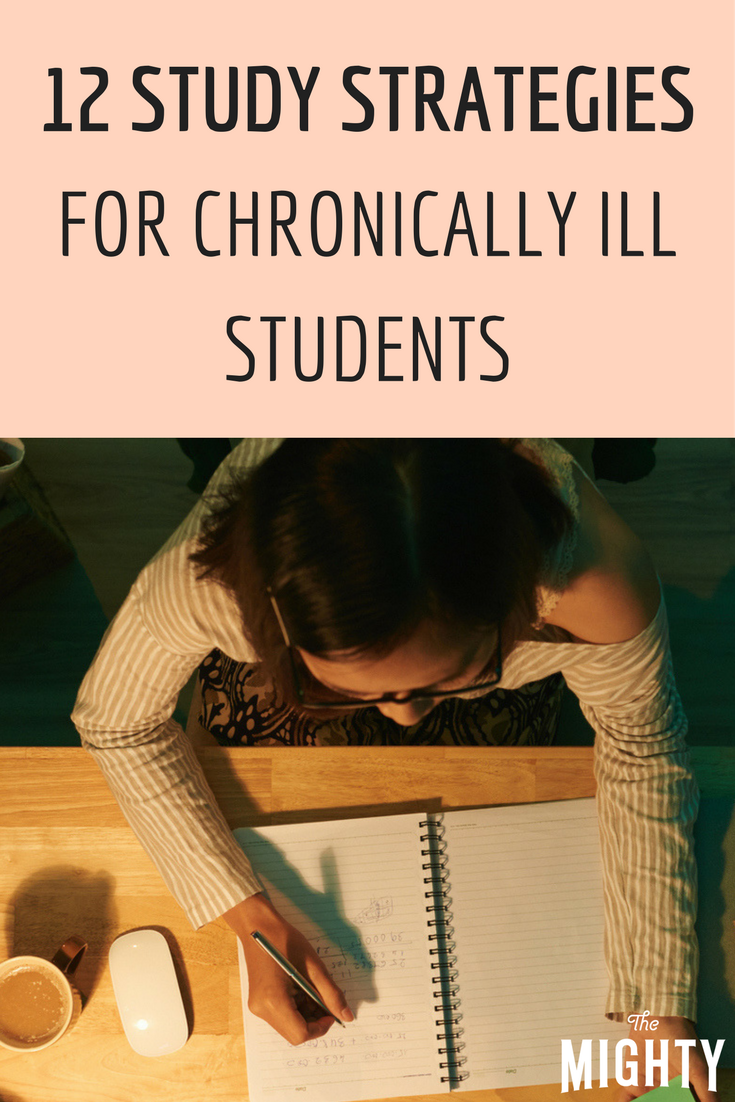Like many people with chronic illnesses, I struggle with brain fog, which complicates my academics. It has been a lot of trial and error over the last five years, but I have managed to find all the strategies that ensure my academic success in both high school and college. Here are some of my most effective study strategies:
1. Flashcards. Not only is making flashcards an excellent way to learn information that is not super conceptual in nature, but writing out the information is also another way to retain information. If writing is not an option for you, there are free flashcard generating websites like Quizlet.com that allow you to type in the information for the front and the back; then you print them. The site can automatically create tests and study guides, which is also helpful.
2. Color coding material. This can also help. I use yellow for the key terms/definitions, orange for little critical thoughts, blue for statistics/numbers/dates, green for conceptual ideas, and pink for any miscellaneous information of importance. This is my system, but any color can be used for anything. It is another method to ensure data retention.
3. Get a tutor or go to office hours. As freshman, we hear it over and over.
“Go to office hours.”
“Get to know your professor.”
“Get a tutor.”
Yet, most people, chronically ill or not, don’t take advantage of these resources. Most teachers love it when students email with questions, stop in for office hours for clarification and make an extra effort to do well. Freshman year, I did not go to office hours regularly, and it showed in my grades. Now my grades are much better because I work with my professors regularly. There’s no shame in getting extra help if you need it. It is better than failing the class, losing money, and having to retake it.
4. Highlighters. I separated this from color coding because the strategy is a little bit different. Highlighters help me keep my place and focus while I am reading. On bad days, I highlight the whole page just to keep my place.
5. Mnemonics. The sillier or more ridiculous the mnemonic is, the better I remember it. It can be an advantageous strategy.
6. Reading out loud. Sometimes reading aloud can help to focus on the material, especially when there are hundreds of pages you need to read. It keeps you from going on autopilot and merely skimming the material.
7. Study group. Studying is less miserable with friends. You can quiz each other, which helps both of you to study because it forces one to answer the question and one to explain why the answer is what it is.
8. Don’t cram! Our brains are taxed enough as it is, there’s no reason to exacerbate your conditions by overworking yourself. A little bit every day goes a long way.
9. Make a study timetable. Fill in doctor’s appointments and treatments in first. Then add the things you want to do, hobbies, sports, clubs, volunteering, etc. Next, add in work, and the time you will be studying. If you add the studying in first, you won’t have time for other things, which means that the study plan will go out the window faster.
10. Take a reasonable amount of credits. I always say I would rather take 12 credits a semester and end up with a 4.0 and on the dean’s list versus taking 18 credits, getting a 3.25, and not doing anything fun. If you can’t take a full load, that’s perfectly fine! Slow and steady gets the diploma.
11. Time management is so important in the life of a student. We only have so many spoons a day to accomplish everything we need to, so it is important to ensure that we are maximizing our chance to succeed. That’s why I avoid procrastinating. (Well, usually!) It is easier to do work when I am not as symptomatic, but sometimes it can be hard to motivate myself to study when I am feeling a little better versus doing something I want to do.
12. Most importantly, stay organized! I recommend a single notebook for each class with a large binder with several folders. Label those folders and keep all the papers inside. This keeps them organized, prevents loss of important papers and assignments, and keeps them from getting wrinkled.
When I found these strategies, my grades dramatically improved despite all of my conditions. It was not easy to find them, and some of them don’t work every day. It is all trial and error, but hopefully, this list gives you some places to start. While this is directed at individuals with chronic illnesses, these strategies can be easily applied by anyone.
We want to hear your story. Become a Mighty contributor here.
Thinkstock Image By: DragonImages


